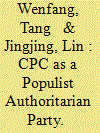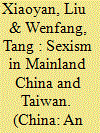| Srl | Item |
| 1 |
ID:
172265


|
|
|
|
|
| Summary/Abstract |
This study examines the political attitude and behaviour of the rank-and-file members of the Communist Party of China (CPC). It compares five generations of Party members that carry distinctive memories during their political socialisation, and the findings show a significant decline in Party identity among the younger members. The empirical evidence, drawn from five national surveys of 11,989 respondents including 1,607 Party members, also suggests that the CPC has moved towards the trend of a populist authoritarian party.
|
|
|
|
|
|
|
|
|
|
|
|
|
|
|
|
| 2 |
ID:
175193


|
|
|
|
|
| Summary/Abstract |
This study compares gender discrimination or sexism in mainland China and Taiwan by means of a social experiment. Mainland China, with its radical egalitarian socialist policies implemented in a centrally planned economy and during the Cultural Revolution, serves as the treatment group in this social experiment. Taiwan, with its conventional path of economic modernisation, political liberalisation and importation of post-material values, is set as the control group. Using the Sixth Wave World Values Surveys, this study finds a higher level of explicit sexism in mainland China than in Taiwan due to China's post-Mao market reform. Interestingly, Taiwan shows a stronger effect of hidden sexism than China. China's low level of hidden sexism could be attributed to its radical social and economic egalitarian policies from the 1950s to the 1970s. The article concludes by suggesting that while democracy is capable of promoting postmodern values such as feminism, it is less effective in eliminating hidden sexism, and that government policy is imperative to mitigating the negative effect of market capitalism on gender equality.
|
|
|
|
|
|
|
|
|
|
|
|
|
|
|
|
| 3 |
ID:
136431


|
|
|
|
|
| Summary/Abstract |
Using data from several Chinese national and cross-national public opinion surveys conducted between 1992 and 2008, this article proposes new ways to measure religiosity in China by separating institutional religiosity from diffused religiosity. The findings show that while institutional religiosity is exceptionally low in China, diffused religiosity is surprisingly high, increasing rapidly between the early 1990s and late 2000s. Furthermore, this latter group promotes regime support and political and economic efficacies. The article concludes by pointing out the importance of using multiple measurements of religiosity in future comparative research
|
|
|
|
|
|
|
|
|
|
|
|
|
|
|
|